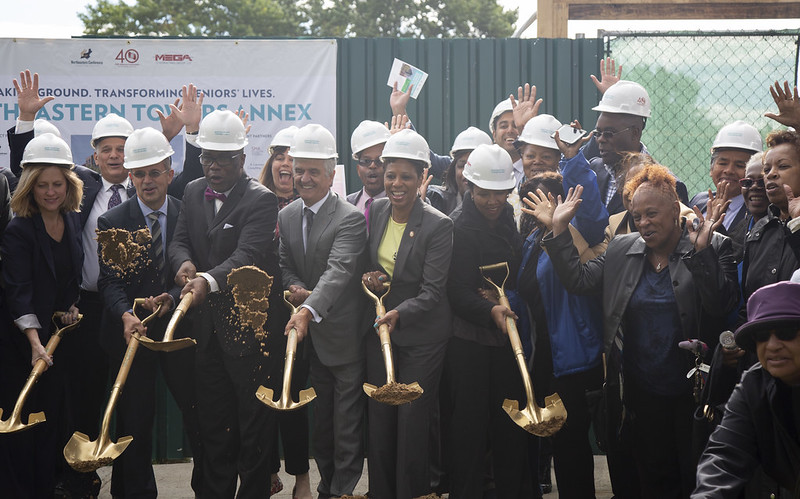
Ground-breaking (photo: John McCarten/City Council)
A month before COVID-19 swept through the five boroughs, headlines about New York City’s historic economic growth were abounding. Yet, even as the growth of the city’s economy reached historic heights, a crisis of inequity persisted in Black and brown communities, who were facing higher rates of unemployment, less investment and growth, poorer health outcomes, and limited access to a pool of fewer resources. A global pandemic only exacerbated those inequities and forced communities of color to shoulder the disproportionate impact of the public health and economic crises.
Two years later, this crisis of inequity persists, despite countless community development organizations, including the organization I lead, having proposed thoughtful solutions to help these communities become more resilient. Now, with new administrations leading both the New York state and city governments, it’s critical the wait-and-see approach comes to an end and that government, public institutions, and the private sector come together to advance public policy and programs that once-and-for-all forge a recovery and equitable future for our city.
Here’s how.
Solving the Affordability Crisis
With more than 70% and 80%, respectively, of Black and Hispanic households in New York City being renters, it’s critical the skyrocketing cost of living for renters is addressed immediately, particularly with the end of the eviction moratorium.
That requires a few things we’ve been calling for. First and foremost, government must renew the Emergency Rental Assistance Program to support the thousands awaiting relief.
Second, state and city government need to shift our faltering project-by-project approach to affordable housing financing to reduce our dependence on government subsidies, and instead rely on creative financial tools — including revolving loan funds and equity products — that are geared toward preserving affordability.
Finally, homeownership is the leading pathway toward building generational wealth, and it’s an opportunity that’s been out of reach for far too many New Yorkers of color. To ultimately address the affordability crisis, we need programs that help and encourage people, especially people of color, to become property owners.
Investment in Minority-Owned Businesses
Among the most financially devastated businesses during the pandemic were minority-owned businesses, facing the dual threat of systemic inequity and pandemic-induced challenges.
That’s why as both the state and city governments finalize their next budgets, we’re asking that funding is specifically targeted toward the minority-owned businesses that make up once-vibrant commercial corridors in communities of color.
Without this targeted approach, we run the risk of countless minority-owned businesses closing, blight taking hold of commercial corridors, and underserved neighborhoods, in turn, failing to meet the challenge of a full recovery and allowing outside companies to seize shuttered mom and pop businesses – driving up prices and forcing long-standing community members out.
To address this risk, we developed innovative relief programs that not only provided immediate financial support to minority-owned businesses in desperate need but also the tools they’ve long been neglected, including access to institutional financial resources and networks, training, and mentorship opportunities. It’s an opportune moment for government and private institutions to structure their relief programs similarly.
Closing the Digital Divide
As countless companies went online to continue their operations during the pandemic, minority-owned businesses found themselves in neighborhoods without high-speed broadband or without the capacity to take their businesses online.
Pandemic or not, tapping into digital networks is the way of the future for business but also for access to medical services, education, and global communications. To allow Black and brown communities to keep pace in this ever-digitized environment, we’re calling on government and private institutions to support major investment in internet infrastructure, improvements in technological assistance and cybersecurity, and legislation that would require the Federal Communications Commission to increase broadband access in communities of color.
Restoring Confidence in Underserved Neighborhoods
Finally, systemic inequities, the lack of opportunity, and the feeling of disenfranchisement have led to an understandable loss of trust in our institutions in communities of color. These upstream doubts have downstream consequences.
It’s paramount that all levels of government devote their attention and resources to ensuring that confidence and trust can be restored in communities of color through action. These communities need to see that investment is being committed to their schools, businesses, infrastructure, and people; they need to see that our elected leaders and public officials care.
Government, Community Development Financial Institutions, nonprofits, and institutions must work together to develop thoughtful economic development programs that uplift underserved neighborhoods and show them a path forward. And, to ensure these community-based organizations and nonprofits can sustain their operations, we must double down on efforts to empower them with the resources and financial support needed to improve long-term outcomes in our disinvested neighborhoods.
The past two years certainly laid bare the inequities and disproportionate burden that Black and brown communities are forced to contend with. But, enough is enough. Let’s get to work, take lessons learned during the pandemic, and commit to making these neighborhoods more resilient.
***
Valerie White is the executive director of LISC NYC, an economic development non-profit. On Twitter @LISC_NYC.
***
Have an op-ed idea or submission for Gotham Gazette? Email This email address is being protected from spambots. You need JavaScript enabled to view it.




